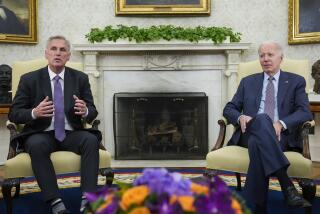Big issues remain in financial reform negotiations
- Share via
Reporting from Washington — Laboring late Wednesday to complete a sweeping overhaul of financial industry regulations, congressional negotiators faced a self-imposed Friday deadline to take up some of the most controversial issues in the bill, ones that affect the pocketbooks of both consumers and big banking institutions.
Among the major issues to be resolved are a White House-backed proposal to curb some of the riskiest and potentially most lucrative bank practices, plans to increase regulation of derivatives and final details of a ground-breaking new consumer protection agency.
House negotiators, in an expected but important concession, agreed Wednesday to back down from demands that the bill include a $150-billion fund — endowed by large financial institutions — to cover costs should any major banks falter in the future and need to be seized to prevent a threat to the economy.
However, they attached strings to the concession that require regulators to certify that they have a plan to pay for liquidations after the fact.
On the remaining issues, House Financial Services Committee Chairman Barney Frank (D-Mass.) said talks were on track to have the final bill written, available to the public on the Internet for at least 72 hours and approved by the House next Tuesday.
The Senate then hopes to clear the bill later next week, before Congress begins its Fourth of July recess.
“No one is interested in fomenting uncertainty,” Frank told members of the joint conference committee that is meeting to resolve differences between the House and Senate versions of the bill. “We stay until we finish.”
Democratic leaders are trying to craft major elements of the deal before Friday, when President Obama hopes to take the plan to an international economic summit in Toronto.
But the haggling may drag well into Friday as Obama leaves for the weekend summit of the Group of 20 nations. The White House hopes the bill could provide leverage to encourage other world leaders to revamp their banking systems.
“If we can get this bill done, the U.S. can lead on these issues,” said Senate Banking Chairman Christopher J. Dodd (D-Conn.). But he conceded that “we’re not going to be done before the president leaves for the G-20.”
Negotiators also were expected to agree on the bill’s cornerstone: creation of a new federal agency protecting consumers of financial products, thereby strengthening oversight of the complex world of investment that has baffled many.
A key remaining question is whether there will be a compromise on making auto dealers subject to the new agency’s authority. The House had wanted to exempt the industry entirely; the Senate wanted it covered. The pending compromise would allow the agency to regulate auto dealers only indirectly.
During Wednesday’s negotiations, House Democrats also proposed adding $4 billion to the bill for community development to provide relief for people facing foreclosure because they are unemployed. Republicans objected to that proposal. The amendment is expected to face opposition from the Senate, where budget concerns run stronger than they do among liberal Democrats who sponsored the amendment.
Among the thorniest outstanding issues is a Senate proposal to bar commercial banks from engaging in some risky investment banking practices.
The proposal, the so-called Volcker rule, named after former Federal Reserve Chairman Paul Volcker, who devised it, would ban most depository institutions from proprietary trading, that is, using their own funds to reap profits rather than acting on behalf of their clients.
That was not included in the House version of the bill. Frank indicated he would support some version of it but was awaiting a proposal from senators that would make the amendment even more restrictive.
He noted that debate over that issue Thursday would shift lawmakers’ focus from the minutiae of the complex legislation to one of the most fundamental issues before them:
“Is the current regulatory structure in the law adequate going forward,” Frank asked, “or do we need to empower regulators with more tools?”
More to Read
Sign up for Essential California
The most important California stories and recommendations in your inbox every morning.
You may occasionally receive promotional content from the Los Angeles Times.











